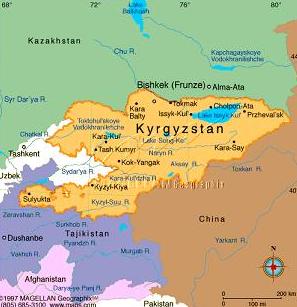At the Geopolitical Crossroads of China and Russia: Kyrgyzstan And The Battle For Central Asia
Kyrgyz President Kurmanbek Bakiyev was deposed five years after and in the same manner as he came to power, in a bloody uprising.
Elected president two months after the so-called Tulip Revolution of 2005 he helped engineer, he was since then head of state of the main transit nation for the U.S. and NATO war in Afghanistan.
The Pentagon secured the Manas Air Base (as of last year known as the Transit Center at Manas) in Kyrgyzstan shortly after its invasion of Afghanistan in October of 2001 and in the interim, according to a U.S. armed forces publication last June, "More than 170,000 coalition personnel passed through the base on their way in or out of Afghanistan, and Manas was the transit point for 5,000 tons of cargo, including spare parts and equipment, uniforms and various items to support personnel and mission needs.
"Currently, around 1,000 U.S. troops, along with a few hundred from Spain and France, are assigned to the base." [1]
The White House's Special Representative for Afghanistan and Pakistan Richard Holbrooke paid his first visit in his current position to Kyrgyzstan - and the three other former Soviet Central Asian republics which border it, Kazakhstan, Tajikistan and Uzbekistan - in February and said "35,000 US troops were transiting each month on their way in and out of Afghanistan." [2] At the rate he mentioned, 420,000 troops annually.




























